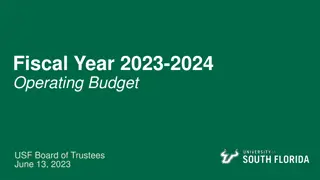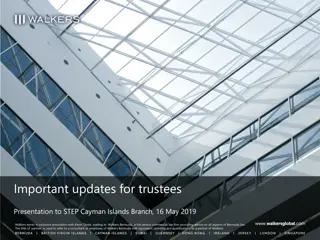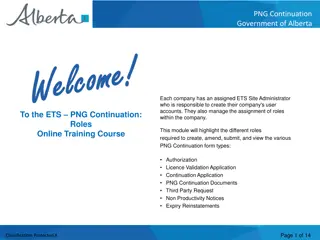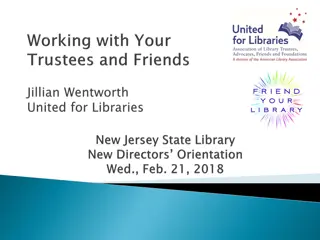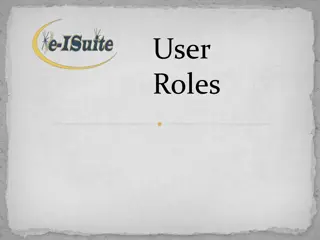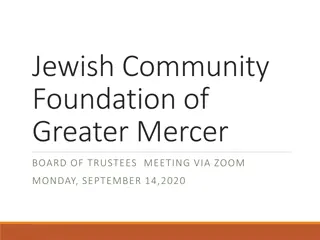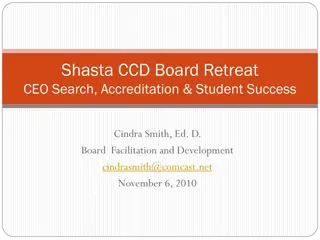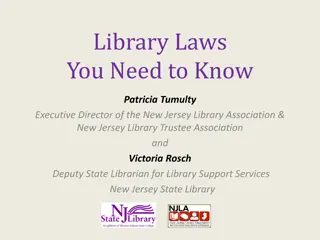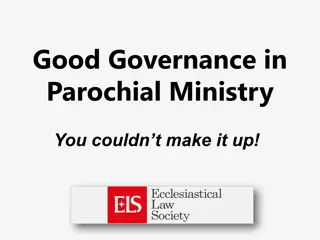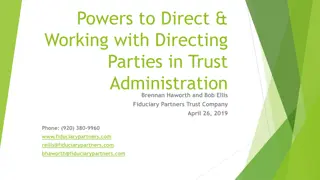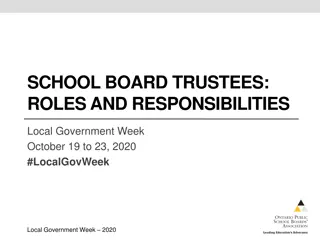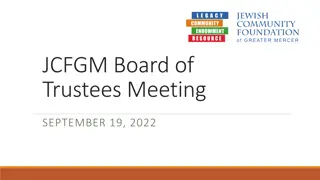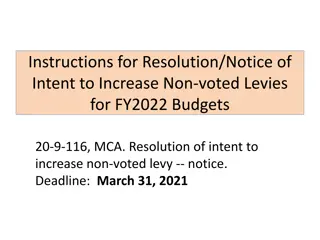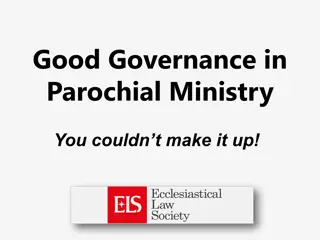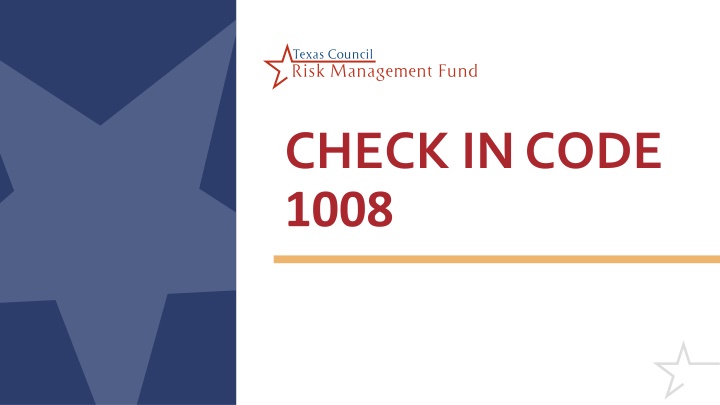
Governmental Entities and Community Centers in Texas
Discover the roles and responsibilities of trustees, the Texas Mental Health and Mental Retardation Act of 1965, the establishment of Community Centers in Texas, and the implications of being a governmental entity on a board member. Learn about the legal frameworks, risks, and management aspects associated with community centers in Texas.
Download Presentation

Please find below an Image/Link to download the presentation.
The content on the website is provided AS IS for your information and personal use only. It may not be sold, licensed, or shared on other websites without obtaining consent from the author. If you encounter any issues during the download, it is possible that the publisher has removed the file from their server.
You are allowed to download the files provided on this website for personal or commercial use, subject to the condition that they are used lawfully. All files are the property of their respective owners.
The content on the website is provided AS IS for your information and personal use only. It may not be sold, licensed, or shared on other websites without obtaining consent from the author.
E N D
Presentation Transcript
CHECK IN CODE 1008
Roles and Responsibilities of Trustees Pamela L. Beach Pamela L. Beach General Counsel General Counsel
Texas Mental Health and Mental Retardation Act of 1965 Authorized local agencies to assume administration of MHMR services Created Texas Department of MHMR Established partnerships between local agencies, the State, and the Federal Government Vague in terms of legal definition and authority of local entity | MANAGING RISKS. HELPING PEOPLE.
Texas Health & Safety Code 534.001 Authorizes county, municipality, hospital district, school district [or organizational combination] to establish and operate a Community Center Community Center plan requires state approval There are now 39 community centers across the state serving all 254 Texas counties | MANAGING RISKS. HELPING PEOPLE.
Texas Health & Safety Code 534.001(c) 1. An agency of the state, a governmental unit, and a unit of local government as defined and specified by Chapter 101 and 102 of the Texas Civil Practice & Remedies Code Texas Tort Claims Act 2. A local government as defined by Section 791.003, Government Code Interlocal Cooperation Act 3. A local government for the purposes of Chapter 2259, Government Code Allows for self insurance by governmental entities 4. A political subdivision for the purposes of Chapter 172, Local Government Code Allows for group benefits programs | MANAGING RISKS. HELPING PEOPLE.
What is different about being Governmental? Why does it matter to a board member? It forces the community center to conduct its business much differently than if it were a private entity It makes the board member a public official subject to various criminal penalties for misbehavior in office | MANAGING RISKS. HELPING PEOPLE.
Should Nots The legislature has adopted the following standards of conduct for state officer: No gifts; No other employment or professional activity where you would have to disclose confidential information of the center; No other employment or compensation that would impair the officer s or employee s independence of judgment in the performance of the officer s or employee s official duties; No investments that would create a conflict; or No bribes. | MANAGING RISKS. HELPING PEOPLE.
Texas Penal Code Section 36.02 Bribery Accepting, agreeing to accept, or soliciting any benefit as consideration for a decision, opinion, recommendation, vote, or other exercise of official discretion Second degree felony, punishable by two to twenty years of imprisonment and a fine of up to $10,000. Sections 36.07 and 36.08 Certain gifts are prohibited You may not solicit, agree to accept, or accept an honorarium in consideration for services you would not have been asked to provide but for your official position. Most public servants are subject to one or more prohibitions on the acceptance of benefits from persons subject to their jurisdiction. Class A misdemeanor, punishable by up to one year of imprisonment and a fine of up to $4,000. | MANAGING RISKS. HELPING PEOPLE.
Texas Penal Code Section 39.02 - Abuse of Official Capacity If with the intent to obtain a benefit or harm or defraud, you intentionally or knowingly violate a law relating to your office or misuse government property, services, personnel, or any other thing of value belonging to the government that has come into your custody or possession by virtue of your office. Class A misdemeanor, punishable by up to one year of imprisonment and a fine of up to $4,000. Section 39.06 Misuse of Official Information As a public servant, you may have access to information that has not been made public. You cannot use such information in the following ways: o You may not use the information to acquire or help another person to acquire a pecuniary interest in any property, transaction, or enterprise affected by the information. o You may not speculate or aid another to speculate on the basis of the information. o You may not disclose or use the information with the intent to obtain a benefit or to harm another. Third degree felony, punishable by two to ten years of imprisonment and a fine of up to $10,000. | MANAGING RISKS. HELPING PEOPLE.
Texas Local Government Code - Conflict of Interest Prohibits a local public official from voting or participating on a matter involving a business entity or real property in which the official has a substantial interest if an action on the matter will result in a special economic effect on the business that is distinguishable from the effect on the public, or in the case of a substantial interest in real property, it is reasonably foreseeable that the action will have a special economic effect on the value of the property, distinguishable from its effect on the public. | MANAGING RISKS. HELPING PEOPLE.
Texas Local Government Code - Conflict of Interest A public official has a substantial interest in a business entity if the official: Owns 10% or more of the voting stock or shares of the business entity Owns either 10% or more or $15,000 or more of the fair market value of the business entity; or Receives funds from the business entity that exceeds 10% of the person s gross income for the preceding year. A person has a substantial interest in real property if the interest is an equitable or legal ownership with a fair market value of $2,500 or more. A public official is also considered to have a substantial interest in a business entity or real property if the official s relative within the first degree of consanguinity (blood) or affinity (marriage) has a substantial interest in the business entity or real property. Spouse, parent child, step-child, father or mother-in-law, or son or daughter-in-law Business that employs the official s daughter if the official s daughter earns an income which exceeds 10% of her gross income | MANAGING RISKS. HELPING PEOPLE.
Texas Local Government Code - Conflict of Interest A public official who has such interest is required to file, before a vote or decision on any matter involving the business entity or real property, an affidavit with the official record keeper, stating the nature and extent of the interest. In addition, a public official is required to abstain from further participation in the matter. However, a public official that is required to file an affidavit is not required to abstain from participating in the matter if a majority of the members of the governing body have a substantial interest and are required to file and do file affidavits of similar interests on the same official matter. | MANAGING RISKS. HELPING PEOPLE.
Youre a health care board! 14 | MANAGING RISKS. HELPING PEOPLE.
OIG Audits Information for Boards Keeping your Board informed Education during each Board meeting Status of Strategic Planning and Measurement Keeping Board Bylaws (and Board policies) current Adherence to contracting procedures Sharing Opportunities for Board Education and Training Training for New Board Members Annual Texas Council Board and Staff Conference Annual Board Retreat Practical Guidance for Health Care Governing Boards on Compliance Oversight 15 | MANAGING RISKS. HELPING PEOPLE.
Ethics Opinions | MANAGING RISKS. HELPING PEOPLE.
Other Relevant Laws Texas Tort Claims Act Texas Civil Practice & Remedies Code, 101.001, et seq Provides immunity from suit for the Community Center unless expressly waived Limitations on damages For bodily injury or death - $100,000 for each person and $300,000 for each occurrence For property damage - $100,000 for each occurrence Texas Payday Act Governmental entities are exempt from provisions of the Pay Day Act Texas Labor Code 61.003 Equal Employment Opportunity Commission (EEOC) Governmental entities are exempt from suit by EEOC Only Department of Justice can sue governmental entities Politely answer the charges, but ALWAYS briefly state you are a governmental entity | MANAGING RISKS. HELPING PEOPLE.
Other Relevant Laws National Labor Relations Act (NLRA) Community Centers are exempt from the NLRA 29 U.S.C. 152 Texas law prohibits governmental entities from collectively bargaining with unions Texas Government Code 617.002 Fair Labor Standards Act (FLSA) Special Provisions that allow governmental entities to deduct from exempt employee s pay for parts of days 29 CFR 541.710 Occupational Safety and Health Act (OSHA) Governmental entities are exempt from OSHA requirements Occasionally we get a complaint, but we have a form letter prepared for a response 29 CFR 1975.5 | MANAGING RISKS. HELPING PEOPLE.
Other Relevant Laws Drug Testing Texas Attorney General opinion which finds random drug testing of governmental employees in Texas is unconstitutional Gratuitous Payment Texas Constitution prohibits gratuitous payments to employees Gratuitous payments cannot include severance payments and bonuses unless they are structured correctly Guns Governmental entities may prohibit employees from carrying guns Governmental entities cannot prohibit clients or visitors from legally carrying weapons Texas Government Code 411.203 | MANAGING RISKS. HELPING PEOPLE.
Other Relevant Laws Open Meetings Act Public Information Act The PIA required that either the Board is trained or the Board can delegate training to an employee is the Center. Don t forget to sign the opt out page! 20 | MANAGING RISKS. HELPING PEOPLE.
First Amendment Audits National trend in the United States in which members of the public film local entity staff doing their work in public spaces 21 | MANAGING RISKS. HELPING PEOPLE.
First Amendment Audits First Amendment Audits Reported In or near police buildings At governing body meetings On sidewalks At crime scenes In parks, at festivals Inside city hall and other municipal facilities First Amendment Audits Now a Long-Term Trend Auditor visits and claims for at least 10 years Both frequent flyers and one-timers Many know how to push buttons and where lines are drawn 22 | MANAGING RISKS. HELPING PEOPLE.
First Amendment Audits National trend in the United States in which members of the public film local entity staff doing their work in public spaces 23 | MANAGING RISKS. HELPING PEOPLE.
Key Takeaways Courts say the public can record any public employee in any public place, including public areas in public buildings Generally speaking, telling an auditor you can t record here when they are in a public place is not appropriate or legalHowever, first responders can request persons to move back to film if they are interfering with operations 24 | MANAGING RISKS. HELPING PEOPLE.
How to handle First Amedment Audits Be prepared at Board Meetings and have a strategy Take a deep breath Be patient and polite Secure any confidential information Don t be provoked 25 | MANAGING RISKS. HELPING PEOPLE.
Health Care Entity The Center is a health care entity. It s important as board members that you ask three questions: Does the Center have a compliance plan? Does the Center have a Compliance officer? Has the board adopted the center Code of Conduct? 26 | MANAGING RISKS. HELPING PEOPLE.
No Gifts!! Federal laws about gifts for health care entities are different and much more stringent. No gifts: there is no de minimus rule. Take nothing, not a pen, not a coffee mug. If the OIG comes in to investigate fraud, these will count as additional crimes. 27 | MANAGING RISKS. HELPING PEOPLE.
Applicable Statutes, Codes, Rules, etc. Texas Health and Safety Code, 534.001, et seq Standards of Administration for Board of Trustees Department of State Health Services o 25 Texas Administrative Cod 411.310 Department of Aging and Disability Services o 40 Texas Administrative Code 1.310 Center By-Laws and Center Plan Texas Government Code 551.001, et seq Texas Open Meeting Act | MANAGING RISKS. HELPING PEOPLE.
534.002 Sec. 534.002. BOARD OF TRUSTEES FOR CENTER ESTABLISHED BY ONE LOCAL AGENCY. (a)The board of trustees of a community center established by one local agency is composed of: (1) the members of the local agency's governing body; (2) not fewer than five or more than nine qualified voters who reside in the region to be served by the center and who are appointed by the local agency's governing body; and (3) a sheriff or a representative of a sheriff of a county in the region served by the community center who is appointed by the local agency's governing body to serve as an ex officio nonvoting member. 30 | MANAGING RISKS. HELPING PEOPLE.
534.003 Sec. 534.003. BOARD OF TRUSTEES FOR CENTER STABLISHED BY AT LEAST TWO LOCAL AGENCIES (a) Except as provided by Subsection (a-1), the board of trustees of a community center established by an organizational combination of local agencies is composed of not fewer than five or more than 13 members. (a-1) In addition to the members described by Subsection (a), the board of trustees of a community center must include: (1) if the region served by the community center consists of only one county, the sheriff of that county or a representative of the sheriff to serve as an ex officio nonvoting member; or (2) if the region served by the community center consists of more than one county, sheriffs from at least two of the counties in the region served by the community center or representatives of the sheriffs to serve as ex officio nonvoting members. 31 | MANAGING RISKS. HELPING PEOPLE.
Health & Safety Code 534.006(b) Before a member of the board of trustees may assume office, the member shall attend at least one training session administered by Center s professional staff to receive information relating to: 1) The enabling legislation that created the Community Center; 2) The programs the Center operates; 3) The Center s budget for that program year; 4) Results of the most recent formal audit; 5) Requirements of Chapter 551 of the Texas Government Code (Open Meetings Act), and Chapter 552 of the Texas Government Code (Public Information Act); 6) Requirements of conflict-of-interest laws and other laws relating to public officials; and 7) Ethics policies adopted by the Center. | MANAGING RISKS. HELPING PEOPLE.
Standards of Administration for Board of Trustees Annual training: Training methodologies may include: presentations by staff at regular board sessions; on-site program visits; statewide and regional training conferences; seminars to enhance team building skills; regional and cross-training with other community centers and their boards of trustees; and formal and informal meetings with tenured trustee members. | MANAGING RISKS. HELPING PEOPLE.
Standards of Administration for Board of Trustees Topics may include: risk management; budget analysis; consumer rights; strategic planning; and new legislative and contractual requirements of community centers. | MANAGING RISKS. HELPING PEOPLE.
Health & Safety Code 534.0065 QUALIFICATIONS; CONFLICT OF INTEREST; REMOVAL. (f) Not later than the date on which a member of the board of trustees takes office by appointment or reappointment and not later than the anniversary of that date, each member shall annually execute and file with the community center an affidavit acknowledging that the member has read the requirements for qualification, conflict of interest, and removal prescribed by this chapter. 35 | MANAGING RISKS. HELPING PEOPLE.
Form A https://www.hhs.texas.gov/providers/behaviora l-health-services-providers/behavioral-health- provider-resources/community-mental-health- contracts 36 | MANAGING RISKS. HELPING PEOPLE.
Form A 37 | MANAGING RISKS. HELPING PEOPLE.
Form A 38 | MANAGING RISKS. HELPING PEOPLE.
Texas Health & Safety Code 534.008 Administration of Board a) The board of trustees is responsible for the effective administration of the community center. b) The board of trustees shall make policies that are consistent with the department s rules and standards. 534.009 Board Meetings a) The board of trustees shall adopt rules regarding the holding of regular and special meetings. b) Board meetings are open to the public to extent required by and in accordance with Chapter 551, Government Code. c) The board of trustees shall keep a record of its proceedings in accordance with Chapter 551, Government Code. The record is open for public inspection in accordance with that law. d) Board of Trustees shall send to the department of each appointing local agency a copy of approved board meeting minutes. | MANAGING RISKS. HELPING PEOPLE.
Texas Health & Safety Code 534.010 Executive Director a) The board of trustees shall appoint an executive director for the community center 534.011 Personnel a) The executive director, in accordance with the policies of the board of trustees, shall employ and train personnel to administer the community center's programs and services. The community center may recruit those personnel and contract for recruiting and training purposes. b) The board of trustees shall provide employees of the community center with appropriate rights, privileges, and benefits. c) The board of trustees may provide workers' compensation benefits. | MANAGING RISKS. HELPING PEOPLE.
H&SC 534.014 Request for Funds (a) Each community center shall annually provide to each local agency that appoints members to the board of trustees a copy of the center s: (1) approved fiscal year operating budget; (2) most recent annual financial audit; and (3) staff salaries by position. (b) The board of trustees shall annually submit to each local agency that appoints the members a request for funds or in-kind assistance to support the center. | MANAGING RISKS. HELPING PEOPLE.
534.021 Approval & Notification (a) A community center must receive from the departmentprior written approval to acquire real property, including a building, if the acquisition involves the use of department funds or local funds required to match department funds. In addition, for acquisition of nonresidential property, the community center must notify each local agency that appoints members to the board of trustees not later than the 31st day before it enters into a binding obligation to acquire the property. (b) A community center must notify the department and each local agency that appoints members to the board of trustees not later than the 31st day before it enters into a binding obligation to acquire real property, including a building, if the acquisition does not involve the use of department funds or local funds required to match department funds. The commissioner, on request, may waive the 30-day requirement on a case- by-case basis. | MANAGING RISKS. HELPING PEOPLE.
Board of Trustee Authority The Board of Trustees can only act (1) through a majority vote (2) at a meeting posted in accordance with the Texas Open Meetings Act (3) in which a quorum of the Board of Trustees is present Individual Board of Trustee members, including the Chair, have no express authority Action, or votes, may only be taken on properly posted items, which usually means listed on the Agenda | MANAGING RISKS. HELPING PEOPLE.
Standards of Administration for Board of Trustees (a) Each board of trustees must: (1) retain all financial records, supporting documents, statistical records, and any other documents pertinent to its community center budgets, contracts, performance/workload measure, and persons served for a period of five years. If audit discrepancies have not been resolved at the end of five years, the records must be retained until resolution; (2) deposit community center funds through the Federal Deposit Insurance Corporation or the Federal Savings and Loan Insurance Corporation, or to secure deposits using collateral in a manner that protects the deposited funds; and (3) ensure that Department of Aging and Disability Services (DADS) and Department of State Health Services (DSHS) have unrestricted access to all facilities, records, data, and other information under control of the community center or its contractors as necessary to enable DADS and DSHS to audit, monitor, and review all financial and programmatic activities and services associated with the center as provided by Texas Health and Safety Code, 534.033(a). | MANAGING RISKS. HELPING PEOPLE.
Standards of Administration con. (b) Before assuming office receive training on: (A) The importance of local planning and the role and function of the board of trustees, planning advisory committees, community center staff, and other service organizations; (B) The current philosophies nad program principles on which service delivery systems are founded information about the service and support needs of people with mental illnesses, intellectual disabilities, and related conditions, and the range of environments in which those services may be delivered; 45 | MANAGING RISKS. HELPING PEOPLE.
Standards of Administration for Board of Trustees (C) an overview of mental illnesses, mental retardation, and related conditions; (D) an overview of the current local and state service delivery system, including descriptions of the types of mental health and mental retardation services provided by the community center; and (E) applicable state and federal laws, rules, standards, and regulations. | MANAGING RISKS. HELPING PEOPLE.
Individual Immunity Three types of immunity apply to public officials Legislative Judicial Qualified/Official | MANAGING RISKS. HELPING PEOPLE.
Legislative Absolute Immunity To be entitled to absolute immunity, the Board member must be performing legislative acts such as Board Resolutions An individual is shielded by absolute immunity, which applies even when the individual is acting in bad faith However, the Board may incur liability for the individual s bad acts | MANAGING RISKS. HELPING PEOPLE.
Qualified/Official Immunity To be entitled to official immunity, the Board member must be: Performing discretionary (not ministerial) duties A discretionary act involves personal deliberation, decision and judgment A ministerial act is one that is prescribed and defined by the law with such precision and certainty as to leave nothing to the exercise of discretion or judgment In good faith Would a reasonably prudent person in the same or similar circumstances have taken the same actions Within the scope of his authority Immunity does not protect a board member from, and a member may be personally liable for, acts that exceed the authority conferred by law, such as false, defamatory statements | MANAGING RISKS. HELPING PEOPLE.
Open Meetings Act Quick Tips 50


